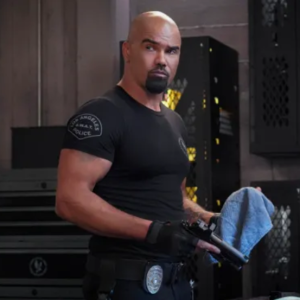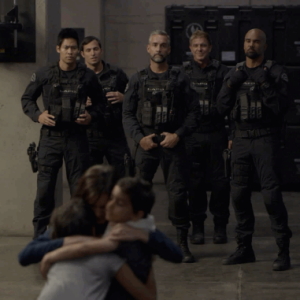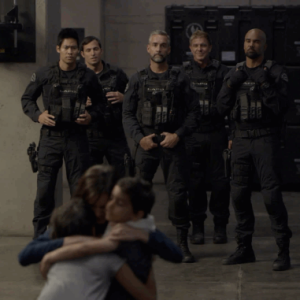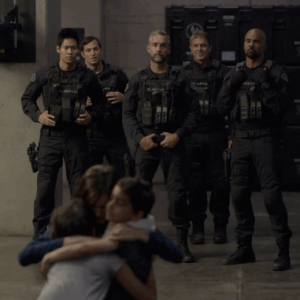Shemar Moore, the charismatic lead portraying Daniel “Hondo” Harrison in the CBS police drama S.W.A.T., offers a compelling insight into why the series, a modern reboot of the classic ’70s franchise, resonates so deeply as a true-to-life action spectacle. He emphatically states that viewers should anticipate an unrelenting, immersive experience that demands their full attention from start to finish. According to Moore, the series is nothing short of a “thrill ride,” an “insane” and “non-stop” odyssey, a testament to the high-octane vision brought to life by director Justin Lin, who helmed the pilot. This commitment to relentless action means an audience will find themselves glued to their seats, foregoing breaks, compelled by the sheer momentum of the narrative unfolding before them. It’s an immersive experience designed to keep adrenaline levels high, distinguishing itself from typical police procedurals by consistently delivering the scale and intensity often reserved for feature films. The show’s tactical sequences are meticulously choreographed, showcasing the precision, teamwork, and raw power inherent in S.W.A.T. operations, from high-stakes hostage rescues to confronting active threats in urban environments. This dedication to depicting realistic S.W.A.T. maneuvers, equipment, and training protocols contributes significantly to its “real-life action movie” feel, grounding its dramatic narratives in a tangible sense of authenticity.
Beyond its undeniable action credentials, Moore highlights a crucial, perhaps even more significant, dimension of S.W.A.T.: its fearless engagement with contemporary societal issues. He stresses that the series intentionally avoids shying away from current events, instead directly confronting the complex and often contentious relationship between law enforcement and the communities they serve. The show actively grapples with difficult subjects such as racism, systemic inequalities, and the pervasive fear and mistrust that can exist between different ethnic groups and the police. This commitment to social commentary elevates S.W.A.T. beyond mere entertainment, transforming it into a platform for vital dialogue. Hondo, as a Black S.W.A.T. team leader who grew up in the very community he now patrols, serves as a crucial bridge figure. His unique perspective allows the series to navigate the nuanced challenges of policing in a diverse, often divided, society. He is an insider who understands the sacrifices and dangers faced by law enforcement but also deeply empathizes with the experiences, frustrations, and grievances of the civilians. This duality allows the show to explore the complexities of community policing, internal departmental politics, and the personal toll the job takes on officers, all while reflecting broader societal debates.
Moore expresses a profound hope that by consistently exploring these sensitive topics, S.W.A.T. can contribute to fostering greater understanding and compassion between the “blue” (law enforcement) and “civilians,” bridging the perceived “versus” dynamic. The series achieves this not through simplistic answers, but by humanizing all sides of these complex interactions. It delves into the backstories and motivations of not only the S.W.A.T. team members – each bringing their own diverse backgrounds, beliefs, and personal struggles to the table – but also the individuals they encounter. Whether it’s portraying the pressures faced by a suspect driven to desperate measures, the impact of crime on a community, or the internal dilemmas of an officer wrestling with moral ambiguities, the show strives to present a multifaceted view. This narrative approach encourages viewers to look beyond superficial labels and consider the underlying circumstances and emotions at play. By showcasing the dedication and sacrifices of the S.W.A.T. team, while simultaneously acknowledging and exploring legitimate civilian concerns, the series aims to dismantle preconceived notions and open pathways for empathy. The ensemble cast, including characters like Deacon, a devout family man; Street, a rebellious but skilled officer; Chris, a trailblazer breaking gender barriers; Luca, with his working-class roots; and Tan, representing different cultural insights, further enriches this tapestry of perspectives. Each character’s personal journey and internal conflicts often mirror the larger societal issues the show tackles, contributing to a holistic and thought-provoking portrayal of modern policing. Through its blend of explosive action and conscientious social dialogue, S.W.A.T. distinguishes itself as a compelling drama that not only entertains with its high-octane sequences but also challenges its audience to engage with and reflect upon the critical social issues of our time, ultimately striving to create a more compassionate world by fostering understanding between police and the communities they serve.





